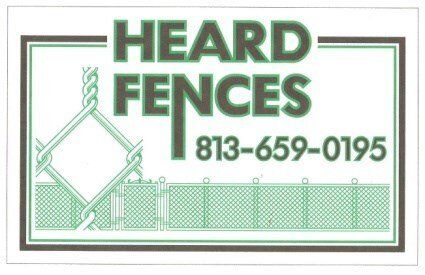Frequently Asked Questions
We try to anticipate questions you might have about our PRODUCTS/ SERVICES and provide the answers here. If you need additional information send email to Angela@HeardFences.com
1. How do I choose a reputable contractor?
You should always ask for a certificate of insurance. The certificate will specify the company's general liability, worker compensation and automobile insurance limits. If they cannot provide proof of insurance, then buyer beware. Also, research their company reviews online, ask neighbors, friends, family and visit the BBI and Angie's List online to see a company's profile and rating.
2. Does Heard Fences use subcontractors?
No, Heard Fences does not use subcontractors. Our employees work for the company and are covered by Heard Fences' workman's compensation insurance, general liability and automotive insurance policy.
3. Are you using quality material that can be warrantied?
Yes. Each warranty differs depending on the product (ie, chain link, pvc, aluminum). Our galvanized systems are warranted for 12 years. Our PVC products are limited lifetime warranty. Our ornamental aluminum products are limited lifetime warranty. Please call our office for more warranty information and brochures. We purchase quality fencing materials from wholesalers that only sell their products to licensed fence installers. These wholesalers include Master Halco, Merchant Metals, Aruvil and Lumber & Fence Products.
4. Do most fence companies require a deposit before installation?
No. Most licensed fence companies do not require a deposit before installation. They do however, require a signed contract which ensures payment upon completion of fence. Custom gates and special orders may require payment up front if the product is custom fabricated and cannot be used in the future. However, confirmation should be signed before ordering to ensure customer agrees with price.
5. Should I concrete my wood fence posts?
No. This is a topic that is debated endlessly. However, we do not recommend concrete on wooden fence posts. Wood shrinks over time and water fills into the gap between the wood and concrete. This causes the fence to rot at the ground and the posts will break off over time. Exceptions are sometimes made for hinge posts.
6. What is the difference between GAW and GBW chain link? And what do you recommend?
There are two different processes for applying zinc to wire: GAW & GBW(GAW) Galvanized After Weave is a process in which wire rod is drawn to the finished gauge, then woven into chain link fabric. The fabric is then pulled through a pot of molten zinc. This process applies 1.2 ounces of zinc coating per square foot of fabric and conforms to ASTM Standards. HEARD FENCES RECOMMENDS GAW. The other process for applying zinc coating to chain link is call Galvanized Before Weaving (GBW). In this process the wire rod is drawn to gauge, and the strand wire is then pulled through a pot of molten zinc. The wire is then woven into chain link fabric. Generally, chain link fabric made using this process carries a zinc weight of .8 ounces per square foot or less.
7. What colors do you offer in the chain link fence?
Standard chain link is galvanized ranging from 11.5ga to 6ga. Also available is vinyl coated chain link fence systems. Colors include black, green and brown vinyl. Black vinyl is the most popular color and a stock item. Brown vinyl coated is not a stock item and may take 2-4 weeks until we can install.
8. What vinyl product do you use?
We use Mid Atlantic Weatherwise vinyl privacy and rail fence systems for residential customers. We also offer Westech, Lakeland, Maxwell and Barrett fence systems upon request. Depending on your specifications, we can find a product that suits your needs. Colors available are white, almond/tan, adobe/clay. Prices vary depending on style and color.
9. Is vinyl more expensive than wood?
Your initial purchase may cost you more than wood; however, this is where your expense ends. PVC is virtually maintenance free but you will need to keep it clean. Cleaning can be done with very little effort using water, a brush with detergent or even a mild bleach solution. The surface of vinyl is a difficult environment for mildew to grown on. Only under the wettest conditions will mildew grow on. If it does appear, it can be easily removed with a mild bleach solution.
10. Can I paint my vinyl fence?
We do not recommend painting any of our products. Epoxy-based paint is the only paint that will adhere properly to the smooth vinyl surface. This type of paint damages the vinyl's surface and voids the warranty.
11. Why should I choose decorative ornamental aluminum over iron fencing?
Decorative Ornamental Aluminum costs just a fraction of custom wrought iron fencing. When you want that custom look, but cost is an issue, there's no better choice than aluminum fence. Aluminum fence is virtually maintenance-free compared to wrought iron's corrosion and upkeep. Our durable powder coat finish requires no maintenance, and is designed to last for years. We offer four standards styles and colors to choose from, and custom colors are available,
12. Do I need a fence permit?
It depends on if your property is in city limits or county limits. Every city/county is different. Please call our office to find out if you require a permit. City of Plant City, City of Temple Terrace, City of Mulberry and City of Lakeland are a few that do require a permit. Hillsborough County does not require a permit; however, there are fencing regulations, restrictions and guidelines that can be found on the Hillsborough County Municode website. Also a Notice of Commencement must be recorded at the Hillsborough County Courthouse if project exceeds 2500.00.







